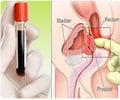Baseline PSA testing at midlife may predict the risk of aggressive prostate cancer in black men, reveals a new study.

TOP INSIGHT
Baseline PSA screening at midlife may help predict aggressive prostate cancer risk in black men.
Read More..
The study finds that baseline PSA levels measured at midlife strongly predicted the risk of total and aggressive prostate cancer in black men years in the future.
"We found that a single, baseline PSA level measured during midlife strongly predicted subsequent diagnosis of total and aggressive prostate cancer up to 12 years after a blood draw," said co-lead author Mark Preston, MD, MPH, a urologic surgeon in the Division of Urology at BWH.
"Our findings suggest that targeted screening based on a midlife PSA might identify black men at high risk of aggressive prostate cancer while minimizing screening in those at low risk."
"Black men in the U.S. are 2.5 times more likely to die of prostate cancer compared to white men, yet screening studies to date have largely been focused on white men," said co-lead author Lorelei Mucci, MPH, ScD, associate professor of Epidemiology at the Harvard T.H. Chan School of Public Health.
The research team took a targeted, risk-stratified approach, leveraging data on men enrolled in the federally funded Southern Community Cohort Study (SCCS), a collection of 86,000 men and women from the Southeastern U.S., that included more than 22,000 black men.
The team found that 95 percent of total and 97 percent of aggressive prostate cancer cases had baseline PSA above the average for their age group. Compared to men with PSA at or below the age-specific median, men with levels above the median had significantly increased the risk of aggressive prostate cancer across age groups.
Men with PSA levels above the 90th percentile had the greatest risk.
The authors noted that increased risk was seen with PSA levels that were higher than the average but still well within the "normal" range - and low enough not to trigger follow-up in usual clinical practice.
"These findings do not imply that prostate biopsy or definitive treatment is immediately required in younger men with higher PSA levels at baseline, as this could lead to over-diagnosis, but that they undergo more intensive PSA screening to enable earlier identification of cancer and potential cure while still possible," the authors write.
Source-Eurekalert
 MEDINDIA
MEDINDIA

![Prostate Specific Antigen [PSA] & Prostate Cancer Diagnosis Prostate Specific Antigen [PSA] & Prostate Cancer Diagnosis](https://images.medindia.net/patientinfo/120_100/prostate-specific-antigen.jpg)


 Email
Email










